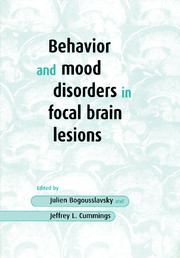Book contents
- Frontmatter
- Dedication
- Contents
- List of contributors
- Preface
- Acknowledgments
- 1 Emotional consequences of focal brain lesions: an overview
- 2 The evaluation of mood and behavior in patients with focal brain lesions
- 3 Methodological issues in studying secondary mood disorders
- 4 Emotional behavior in acute brain lesions
- 5 Depression and lesion location in stroke
- 6 Mood and behavior in disorders of the basal ganglia
- 7 Mania and manic-like disorders
- 8 Behavioral and emotional changes after focal frontal lobe damage
- 9 Disorders of motivation
- 10 Thalamic behavioral syndromes
- 11 Obsessive-compulsive disorders in association with focal brain lesions
- 12 Emotional dysprosody and similar dysfunctions
- 13 Temporal lobe behavioral syndromes
- 14 Neural correlates of violent behavior
- 15 Focal lesions and psychosis
- 16 Alterations in sexual behavior following focal brain injury
- 17 Anosognosia
- 18 Acute confusional states and delirium
- Index
13 - Temporal lobe behavioral syndromes
Published online by Cambridge University Press: 05 August 2016
- Frontmatter
- Dedication
- Contents
- List of contributors
- Preface
- Acknowledgments
- 1 Emotional consequences of focal brain lesions: an overview
- 2 The evaluation of mood and behavior in patients with focal brain lesions
- 3 Methodological issues in studying secondary mood disorders
- 4 Emotional behavior in acute brain lesions
- 5 Depression and lesion location in stroke
- 6 Mood and behavior in disorders of the basal ganglia
- 7 Mania and manic-like disorders
- 8 Behavioral and emotional changes after focal frontal lobe damage
- 9 Disorders of motivation
- 10 Thalamic behavioral syndromes
- 11 Obsessive-compulsive disorders in association with focal brain lesions
- 12 Emotional dysprosody and similar dysfunctions
- 13 Temporal lobe behavioral syndromes
- 14 Neural correlates of violent behavior
- 15 Focal lesions and psychosis
- 16 Alterations in sexual behavior following focal brain injury
- 17 Anosognosia
- 18 Acute confusional states and delirium
- Index
Summary
Introduction
Although the importance of the temporal lobes in behavior and mood has long been recognized by clinicians, the role of these structures is yet to be understood. The literature of the middle third of the twentieth century offers both rich anatomoclinical studies and the first attempts to conceptualize models of behavioral control, with the description by Papez in 1937 of the limbic system (Papez, 1937). Subsequently, experimental studies in animals, especially primates, allowed descriptions of behavioral disturbances directly related to temporolimbic structures. Some of these syndromes, such as the Kliiver-Bucy syndrome, were observed, almost unchanged, in humans. During recent years, knowledge about behavioral syndromes related to temporal lobes has progressed very little compared with the important advances accomplished in the study of cognitive processes. A series of facts may explain this slow rate of progress.
The theoretical framework of human emotions is still controversial, and there are several rival models attempting to explain emotional control (Feyereisen, 1989; Heilman and Watson, 1989; Rolls, 1995; LeDoux, 1996; Heilman, 1997).
Although the cerebral structures integrating human emotions are better delineated, it has been suggested that they may constitute a complex, ‘parallel distributed processing’ network widely distributed within the brain (Mega and Cummings, 1994; Halgren and Marinkovic, 1995; LeDoux, 1995, 1996). Many authors have also insisted on the functional importance of cortico-subcortical circuits (Cummings, 1993a). This type of organization lessens the anatomoclinical value of temporal syndromes.
Apart from their role in emotional functions, the temporal lobes participate in several important congitive capacities, such as memory, language, and access to semantic knowledge, which are frequently impaired when the temporal lobes are damaged. Although these functions are not usually considered to be directly involved in emotional behavior, their impairment results in cognitive deficits, for example aphasia, that make more complex the exploration of behavioral disturbances. Cognitive impairment can be viewed as part of the mechanism of behavioral disturbances. For instance, language allows anticipation of actions and could participate in conscious processes (Rolls, 1995). Language impairment could mediate important aspects of behavioral dysfunctioning. It is interesting to note that some recent theories have put forward the idea that schizophrenia could be considered, ‘as a failure of hemispheric dominance for language’ (Crow, 1997).
- Type
- Chapter
- Information
- Behavior and Mood Disorders in Focal Brain Lesions , pp. 369 - 398Publisher: Cambridge University PressPrint publication year: 2000
- 3
- Cited by



